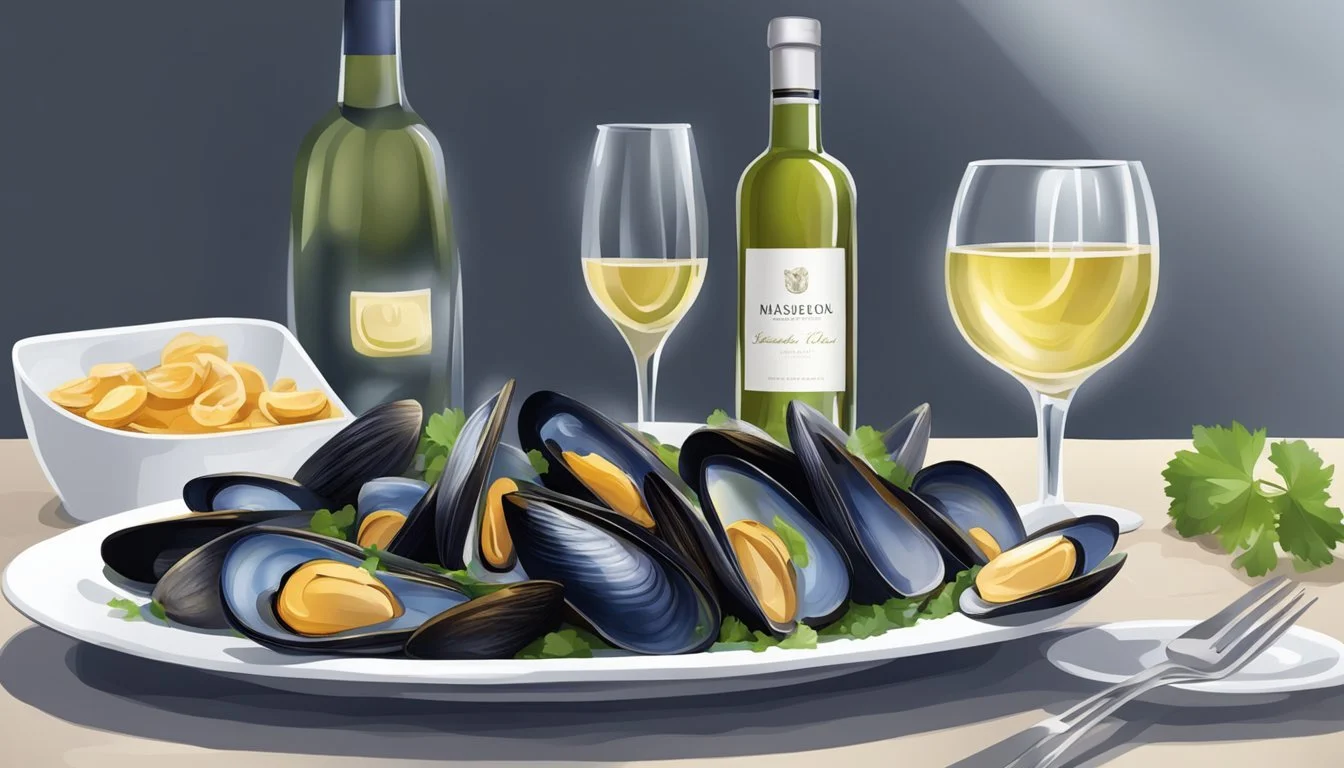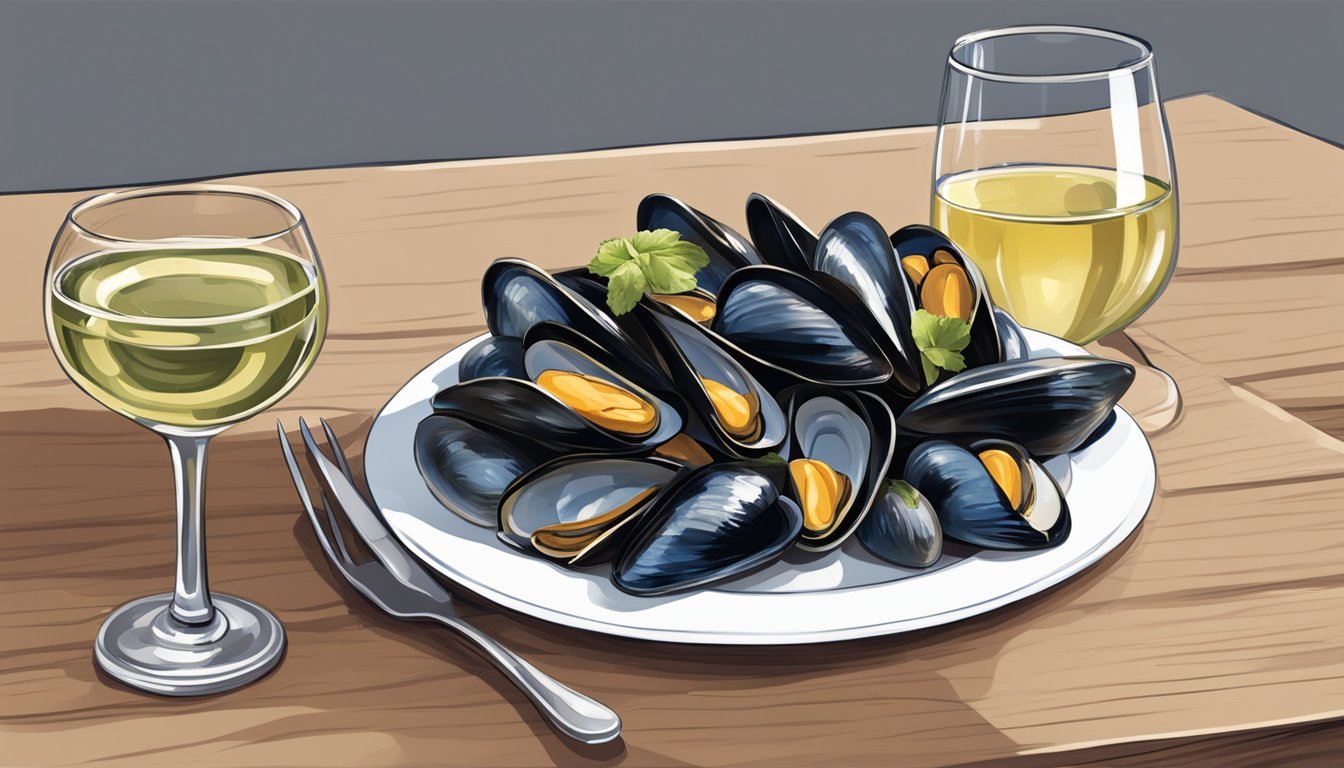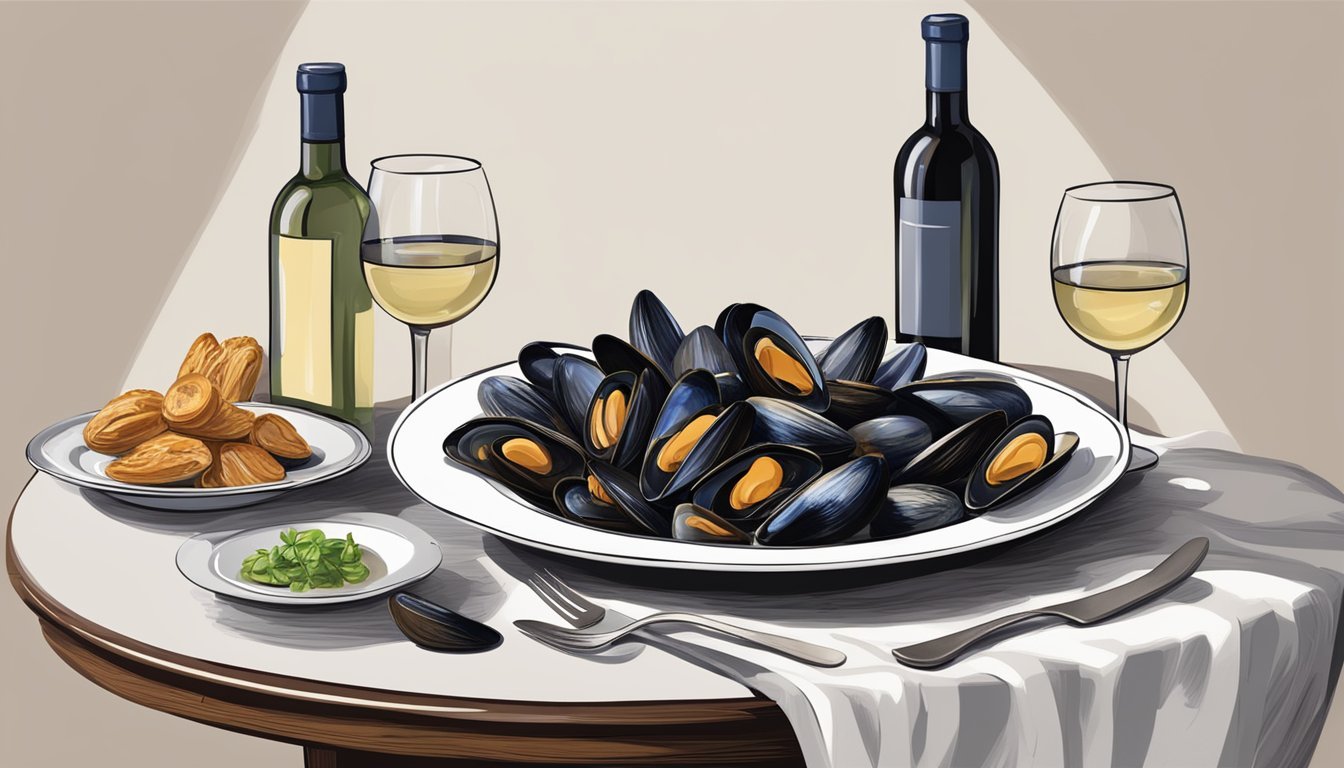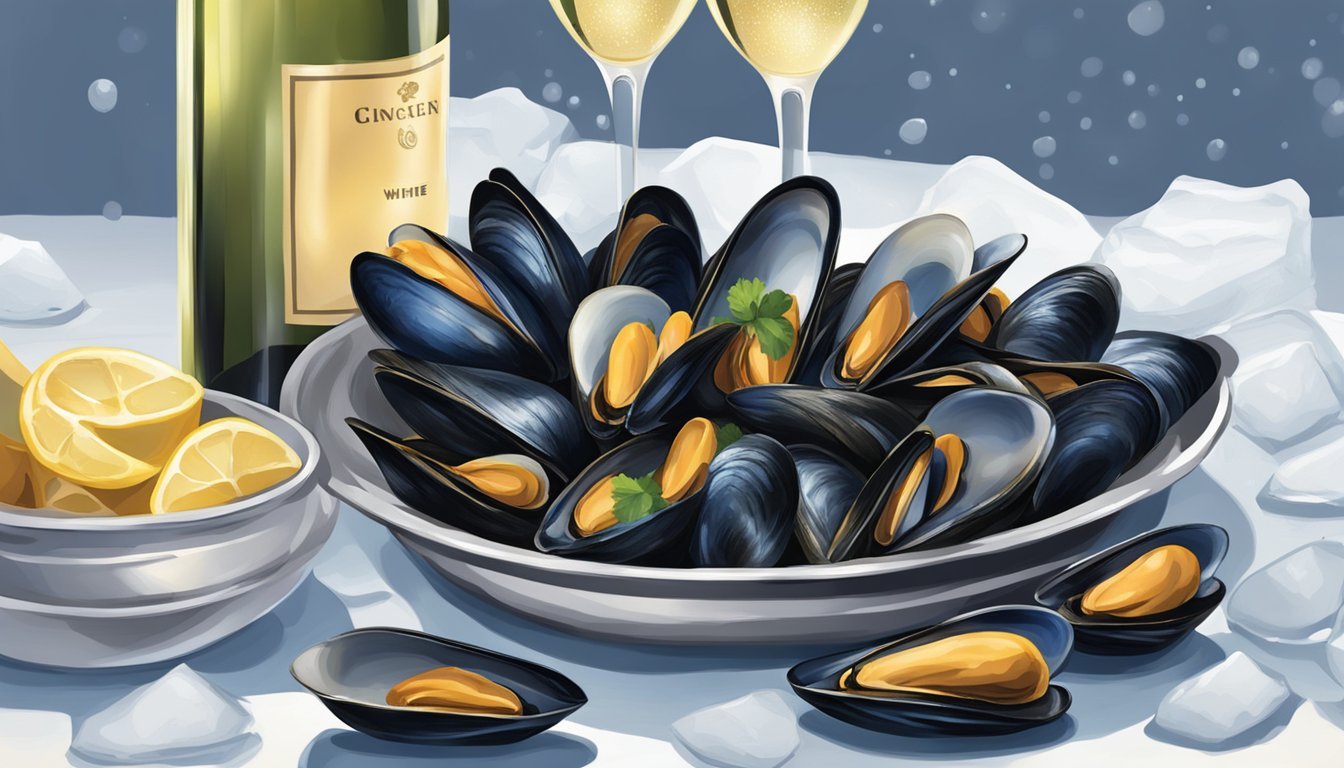What Wine Goes Well With Mussels?
The Best Pairings Revealed
When it comes to creating a harmonious dining experience, the pairing of wine with food is a venerable tradition, resulting from centuries of culinary exploration. Mussels, with their delicate and subtly sweet flavors, present an excellent canvas for wine pairing. The freshness of the ocean found in mussels complements certain wines that share similar qualities
Understanding Mussels
Mussels are a type of shellfish (What wine goes well with shellfish?) that are not only enjoyed for their delicate flavor but are also praised for their nutritional value. They fall into the category of seafood that is consumed globally and can be prepared in various ways.
These bivalve mollusks are a source of high-quality protein and contain a variety of vitamins and minerals that are beneficial to health. One of their most significant contributions is their richness in omega-3 fatty acids, which are essential fats that the body cannot produce on its own.
Nutritional Breakdown of Mussels:
Vitamins: Mussels are a good source of vitamin B12, which is crucial for nerve function and blood cell formation. They also supply vitamins A and C to a lesser extent.
Minerals: These shellfish are notably rich in zinc, a mineral needed for immune system function and metabolic processes.
When incorporating mussels into the diet, one can expect to benefit from these nutrients that play a role in maintaining overall health.
It's worth noting that while mussels are nutritious, the method of preparation can affect their health benefits. For instance, cooking mussels in heavy cream or butter can add additional fats and calories to the dish. Nonetheless, when prepared in a healthy manner, mussels can be a delicious and nutritious part of a balanced diet.
Basics of Wine Pairing
Wine pairing is the practice of matching wines with food to enhance the dining experience. Fundamentals of pairing involve considering the flavors, textures, and weight of both the wine and the dish.
White wines tend to be a popular choice for seafood due to their light body and crisp acidity. The minerality of certain whites can complement the oceanic qualities of seafood like mussels, bringing out subtleties in flavor. An unoaked Chardonnay, with its pure expressions of fruit and clean finish, often pairs well with mussel dishes that have a buttery or creamy base.
With red wines, one seeks harmony within the contrasting elements. Wines with a bright red fruit profile, such as Beaujolais, may pair with certain preparations of mussels without overwhelming the dish.
Here's a simplified pairing guide:
For lighter, brothy mussel dishes:
Crisp, high-acidity whites like Sauvignon Blanc, Muscadet, or Vermentino.
For mussels in cream or butter sauces:
Richer whites such as oaked or unoaked Chardonnay, or Viognier.
For mussels with tomato-based or spicier sauces:
Light, fruit-forward red wines like Beaujolais.
The essence of successful wine pairings lies in the balance these combinations achieve, ensuring that neither the wine nor the food overpower each other, but instead create a harmonious taste experience.
Ideal Wine Choices for Mussels
Selecting the right wine to accompany mussels can elevate the dining experience by complementing the dish's flavors. Here are ideal wine options to consider.
White Wine and Mussels
White wines, with their crisp and often citrus or mineral notes, are a traditional match for mussels. These wines can range from light and zesty to full-bodied and rich.
Muscadet: This wine is known for its light body and mineral qualities, which complement the delicate flavors of steamed mussels without overpowering them.
Chablis: With its high acidity and notes of citrus, this wine works well with lemon-butter-based mussel dishes.
Sauvignon Blanc: It brings out the zest in mussels through its vibrant lime and apple flavors.
Pinot Grigio/Pinot Gris: Offering a balanced profile with hints of lemon, it pairs nicely with garlic and herbs in mussel recipes.
Riesling: The wine's sweetness and notes of citrus make a good counterpoint to the saltiness of mussels.
Viognier: A richer option, it matches well with mussels in creamier sauces due to its full flavor profile.
Red Wine and Mussels
While red wine isn't the classic choice for mussels, there are lighter options that can work if served with the right mussel dish.
Pinot Noir: With its light body and notes of red fruits, it can be an option for mussels with tomato-based broths.
Beaujolais: This wine is known for its low tannins and high acidity, making it a potential, though unconventional, pairing.
Italian Reds: Certain Italian reds, like those with light tannins and a fruity profile, could accompany spicy mussel dishes.
Rosé and Sparkling Wine Options
Rosé and sparkling wines can offer a middle ground with the freshness of white and the fruitiness of red wines.
Rosé: A dry, crisp rosé often plays well with mussels, especially those prepared with vinegar or tomato.
Prosecco: This sparkling wine, with its effervescence and apple notes, creates a lively pairing with mussels.
Spanish Rosé: Noted for its berry flavors and refreshing quality, Spanish rosé can be a delightful accompaniment to mussels.
Choosing the right wine should consider both the preparation method and the sauce or broth's flavor profile. The pairing is subjective, and experimenting to find the perfect match can be part of the fun.
Regional Wine Varieties for Mussels
In pairing mussels with wine, one should consider regional varieties that complement the dish's delicate flavors. Each region's wines offer unique characteristics that can enhance the overall experience of enjoying mussels.
French Influence on Mussels Pairing
The coastal regions of France offer a variety of white wines that harmoniously match with mussels. From the Loire Valley, Muscadet is a quintessential choice, with its zesty acidity and mineral notes that blend superbly with the briny quality of mussels. Moving to Burgundy, Chablis stands out with its crispness and unoaked character, drawing from the Chardonnay grape grown in limestone-rich soils. In the south, Provence and Bordeaux offer white wines which often receive a subtle complexity from aging in French oak barrels, without overwhelming the delicate taste of the seafood.
Loire Valley: Muscadet, crisp and refreshing
Burgundy: Chablis, steely and pure
Italian and Spanish Selections
Italy presents its own celebrated offerings, like Italian Pinot Grigio from Veneto or Friuli, recognized for their lightness and straightforward citrus profile, which plays nicely against the mussel's sweetness. The aromatic Vermentino from coastal regions, particularly Sardinia, infuses a hint of herbaceousness. In Spain, Albariño — with its hallmark stone fruit and citrus aromas from the Rías Baixas region — provides a bright complement to mussels, while a light, refreshing Spanish rosé introduces a touch of red fruit flavors without overpowering the dish.
Italian Pinot Grigio: Light and dry, with notes of lemon
Spanish Albariño: Floral and fruity, with a crisp finish
New World Wine Pairings
Across the ocean, the New World contributes its share of excellent mussels pairings. In California, the Russian River Valley is known for producing Chardonnays with a balance of fruit and acidity that can stand up to rich, buttery mussel preparations. Meanwhile, New Zealand Sauvignon Blanc is renowned for its vibrancy and notes of tropical fruit, which can cut through the richness of heavier mussel dishes with ease.
California: Balanced Chardonnays with a hint of oak
New Zealand: Sauvignon Blanc, zesty and invigorating
Preparing Mussels for Wine Pairing
Pairing mussels with the right wine enhances the flavors of both the food and the beverage. When preparing mussels, consider the cooking method and the sauce ingredients, as these will influence the wine pairing choice.
Classic Moules Marinières
For Classic Moules Marinières, mussels are typically steamed in a sauce made from white wine, garlic, shallots, butter, and parsley. This traditional French dish calls for a wine that is crisp and acidic to complement the briny taste of the mussels and the aromatic quality of the sauce. A white wine such as Muscadet or a well-structured Chablis would heighten the flavors without overwhelming them.
Key Ingredients:
Mussels
White wine
Garlic
Shallots
Butter
Parsley
Mussels with International Flavors
Mussels can adopt a variety of international flavors. A dish such as Mussels with Coconut and Coriander would pair well with wines that mirror the dish's aromatic complexity. A Viognier or a dry Riesling, with their aromatic profiles, would complement the sweet creaminess of coconut and the bright citrus notes from lemongrass, lime, and coriander.
Key Ingredients:
Mussels
Coconut
Coriander
Lemon or Lime
Sauces and Soups
Cream Sauce and Tomato Sauce are popular bases for mussel dishes. For creamy mussels, like a mouclade with a rich cream sauce, a fuller-bodied Chardonnay would provide a nice balance to the creamy texture. Tomato-based mussel soups or stews benefit from wines with good acidity, such as a Sauvignon Blanc or a light-bodied Pinot Noir, to cut through the acidity of the tomatoes.
Key Ingredients for Cream Sauce:
Cream
Butter
Wine
Key Ingredients for Tomato Sauce:
Tomatoes
Spices
Sea Salt
Wine
Mussels served in a light broth or Soup may be accentuated with a sip of Pinot Grigio or Albariño, which will enhance the subtle flavors of the sea without dominating the palate.
Complementary Food Pairings
Selecting the proper food pairings can accentuate the flavors of both the mussels and the accompanying wine, creating a harmonious dining experience.
Seafood and Crustacean Companions
Mussels pair exceptionally well with other seafood and crustaceans, creating a delightful marine medley. For example, shellfish like shrimp or lobster can be tossed with pasta and a white wine sauce, brightened with a squeeze of lemon and a garnish of parsley for an integrated dish.
Pasta with shrimp and a hint of garlic
Lobster tail with a buttery chardonnay sauce
Vegetable and Salad Accompaniments
The briny sweetness of mussels finds a perfect match with fresh greens. A crisp salad dressed with a lemon vinaigrette complements the sweetness and works well with the lightness of a chosen wine. Vegetables like rhubarb can be stewed and added to salads for an unexpected but pleasing contrast.
Baby greens with a citrusy dressing
Arugula salad with thin slices of peach
Meat and Poultry Pairings
While mussels are often enjoyed with other seafood, they can also complement white meats such as chicken or pork. When preparing these dishes, one might opt for simple seasonings to let the flavors of the mussels and wine shine.
Grilled chicken with a lemon and herb marinade
Pork tenderloin (What wine goes well with pork tenderloin?) with a delicate sauce of wine and herbs
Alternative Beverages for Mussels
While wine is a classic choice for mussels, there are a variety of other beverages that can complement the dish's flavors. This section explores some popular alternatives that include beer, non-alcoholic options, and cocktails.
Beer and Mussels
A cold beer can be just as satisfying as wine when paired with mussels. Pilsners are particularly well-suited due to their crisp and refreshing nature, which can cleanse the palate between bites. The slight bitterness and carbonation offer a balance against the mussels' brininess and sweetness.
Belgian Witbier: A light Witbier with hints of coriander and orange peel can echo the dish’s flavors.
Pilsner: A classic pilsner offers a clean and sharp contrast to the rich, savory profile of mussels.
Non-Alcoholic Pairings
Not everyone indulges in alcoholic beverages, but this doesn't mean that mussels cannot be paired effectively. Non-alcoholic options such as sparkling water, infused with herbs or citrus, can rival the complexity of traditional pairings.
Sparkling Water with Lemon or Lime: Citrus notes cut through the richness of the dish.
Herbal Infusion: Combinations like mint and lime in iced tea can mirror the refreshing aspect of alcoholic pairings.
Cocktails and Mixed Drinks
Cocktails can add an adventurous twist to your mussels dining experience, especially by incorporating complementary flavors of herbs and citrus.
Soda with a Twist of Citrus: A simple Soda water with a fresh squeeze of lemon or lime offers a refreshing pairing.
Campari-Based Cocktails: The bitter, herbal notes of Campari mixed with soda and a citrus garnish can highlight the mussels' natural sweetness.
Enhancing the Flavors
Selecting the right wine to pair with mussels can significantly enhance the dish's inherent flavors. Wines that complement mussels tend to have certain properties that interact well with the ingredients commonly used in mussel dishes. Here is a breakdown of how different wine characteristics can serve to elevate the mussel culinary experience:
Acidity: Acidity in wine cuts through the richness of mussels, especially when prepared with butter. A wine with good acidity, such as a Sauvignon Blanc, adds a refreshing contrast to the dish.
Citrus and Herbs: Wines with citrus notes or herbal undertones can echo the flavors of mussels seasoned with herbs and spices. Look for wines that carry the hint of lemon or lime to pair with mussels cooked with similar ingredients.
Floral Notes: To mirror the subtleties of dishes that include floral spices such as nutmeg, select a wine like a Viognier, known for its notes of honeysuckle and vanilla.
A Guide to Wine Selection for Mussel Dishes:
Muscadet
Characteristics: Steely, crisp
Best Paired With: Classic steamed mussels
Chablis
Characteristics: Elegant, minerally
Best Paired With: Mussels in a garlic-herb broth
Vermentino
Characteristics: Refreshing, slightly herbaceous
Best Paired With: Mussels with a light herb sauce
Sauvignon Blanc
Characteristics: Zesty, aromatic
Best Paired With: Citrus or herb-infused mussel dishes
Viognier
Characteristics: Floral, creamy
Best Paired With: Mussels with creamy sauces (What wine goes well with creamy sauces?) or vanilla notes
When pairing mussels with wine, remember that the goal is to balance the flavors without overpowering the dish. Delicate seafood like mussels benefit from a wine that can support and uplift its flavors, creating a cohesive dining experience.
Dessert Pairings After Mussels
After enjoying a savory plate of mussels, diners might look for a dessert that complements the meal — and the choice of wine can be pivotal in this transition. An ideal dessert pairing maintains a balance between sweetness and acidity, considering the briny nature of the mussels.
Sweet wines are traditionally favored for closing a meal. An off-dry Riesling or a Moscato d'Asti can be a delightful choice, providing a sweet counterpoint with sufficient acidity to cleanse the palate. These wines pair well with fruit-based desserts (What wine goes well with fruit-based desserts?) or lighter confections which won't overpower the wine's delicate profile.
For those who prefer desserts with a bit of a citrus note, a Grüner Veltliner stands out with its subtle sweetness and vibrant acidity. It has the capability to cut through richer desserts while harmonizing with the yeasty complexity of pastries.
Off-Dry Riesling
Dessert Suggestion: Lemon Tart or Fruit Sorbet
Note on Pairing: Balances tartness and sweetness, refreshing the palate.
Moscato d'Asti
Dessert Suggestion: Almond Biscotti or Pavlova
Note on Pairing: Complements light, sweet flavors without overwhelming.
Grüner Veltliner
Dessert Suggestion: Yeast Cake or Citrus Pudding
Note on Pairing: Accentuates citrus notes and complements yeasty aromas.
One must be cautious not to pick a dessert wine that is overwhelmingly sweet, as it can clash with the residual flavors of the mussels. The objective is to create a harmonious blend of flavors, allowing the palate to transition smoothly from the savory to the sweet.
Health Considerations of Mussels and Wine
Mussels are a nutritious addition to many diets, touted for their beneficial components. Rich in omega-3 fatty acids, they contribute to heart and brain health. They are also a potent source of essential vitamins and minerals, including vitamin B12, vital for nerve function and blood cell formation, vitamin A, key for the immune system and vision, and zinc, which aids in immune response and wound healing.
Concerning wine, moderation is the cornerstone. While wine, particularly red wine, is often mentioned for its potential health benefits due to antioxidants like resveratrol, it is the alcohol content that requires attention. Consumption should be mindful, as excessive intake can lead to adverse health effects.
Those interested in pairing mussels with wine should be aware of shellfish allergies. Mussels can trigger allergic reactions in some individuals, causing symptoms ranging from mild to severe. It’s important to know one’s allergies before consuming mussels.
Omega-3
Benefit: Supports heart and brain health
Consideration: Check for freshness of mussels
Vitamin B12
Benefit: Aids in blood cell formation
Consideration: Consume in moderation
Vitamin A
Benefit: Supports the immune system
Consideration: Watch for allergic reactions
Zinc
Benefit: Promotes wound healing
Consideration: Alcohol - Limit intake
Those pairing mussels with wine should do so thoughtfully, balancing enjoyment of the dish with a mindful approach to consumption for health.
Sourcing and Storing Mussels and Wine
When purchasing mussels, one should opt for fresh, live mussels that are sold on ice. These should be closed or close when touched, indicating their freshness. It's important to prioritize sellers who focus on sustainability and eco-friendly harvesting practices to ensure the wellbeing of marine ecosystems.
Upon acquiring fresh mussels, they must be stored properly to maintain freshness and safety. One should place them in an open container covered with a damp cloth in the refrigerator. This setup allows mussels to breathe and stay moist, but they should be consumed within two days.
Wine Selection and Storage:
Muscadet
Storage Temperature: 45-55°F (7-13°C)
Chablis
Storage Temperature: 45-55°F (7-13°C)
Vermentino
Storage Temperature: 45-55°F (7-13°C)
Sauvignon Blanc
Storage Temperature: 45-55°F (7-13°C)
Viognier
Storage Temperature: 45-55°F (7-13°C)
Chardonnay
Storage Temperature: 45-55°F (7-13°C)
Wine experts will often advocate for storing wine, especially those selected to pair with mussels, in a dedicated wine cellar or cooler. This ensures optimal temperature and humidity control, which are critical in maintaining the wine's integrity until it's ready to serve. The significance of correct storage temperature cannot be overstated; it preserves the wine's flavor profile and drinking experience, which in turn complements the delicate flavors of mussels.
It's beneficial to possess a basic knowledge of wine cellars and the principles of storage. Wines suited for mussels typically favor cooler storage temperatures—generally between 45-55°F. A stable environment without temperature fluctuations is also key to safeguarding both the wine and its potential pairing with seafood.










